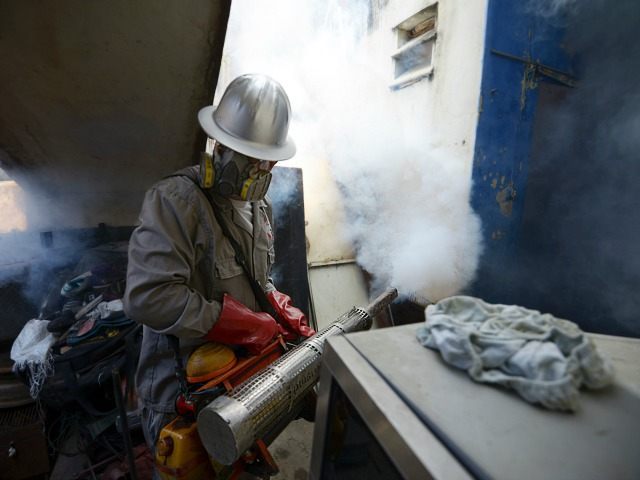Venezuela may be the weakest link in the fight against Zika in the Americas, Colombian Health Minister Alejandro Gaviria warned this week, with experts asserting that the socialist nation may be hiding hundreds of thousands of cases of contamination of the pervasive virus.
Accusing Venezuelan health officials of “an epidemiological silence,” Gaviria noted that Venezuela appears to have “no systematic reporting of the data” regarding how many people nationwide have been confirmed to carry the Zika virus. “This is a serious problem,” he underlined. Gaviria estimates that Colombia may conclude 2016 with up to 650,000 cases of Zika recorded within their borders.
Colombian health officials have confirmed 20,297 cases of Zika since Brazilian scientists identified the African virus in the region in 2015. Of these, 2,100 are pregnant women, who suffer greater risk of serious harm though contracting the virus. While most Zika patients – 80 percent – do not experience any symptoms, and those who do experience only mild fevers and aches. Pregnant Zika patients, however, run the risk of passing the virus to their unborn children. Brazilian scientists have tied the virus to microcephaly, a severe deformity in infants in which the skull does not develop to fit the brain, causing significant neurological damage.
Venezuela has reported a significantly smaller number of Zika cases than Colombia, despite the countries sharing a border. Official Venezuelan estimates claim medical experts have recorded 4,700 suspected cases of Zika. Health Minister Luisana Melo is leading a door-to-door awareness campaign, teaching residents in urban and poorer areas how to dispose of still water properly and keep from inadvertently developing breeding grounds for Aedes aegypti, the mosquito known to carry Zika, as well as Dengue, Chikungunya, and Yellow Fever.
The Venezuelan Health Ministry stopped issuing weekly health bulletins more than a year ago, Reuters notes, meaning no official record of the number of suspected Zika cases before the government published the 4,700 number exist. Infectious disease specialist Julio Castro tells Reuters he believes the real number of cases is in the six digits, somewhere between a quarter and half a million people.
The Venezuelan government has not released information regarding the number of Zika cases in pregnant women, those most at risk for serious damage from the virus. The Health Ministry has, however, reported that 255 of the known cases appear to be linked to Guillain-Barré Syndrome, a serious disorder that affects mobility.
While the government has insisted it is prepared to treat Zika patients, many observers fear that the Venezuelan health care system is too weak to control a pandemic, as the National Institutes of Health have deemed this Zika outbreak. Venezuela’s health services depend heavily on Cuban doctors forced to work for living stipends by their communist government. Cuban doctors, while heralded by the international left, are often significantly undertrained, and have caused international incidents through training programs that have generated incompetent local doctors in nations like Tuvalu.
In addition to the questionable ability of Venezuela’s important medical help, the nation has suffered from intense shortages of most common medications. One local report claims that those already suffering from Zika have no access to basic medical goods like aspirin, and women looking to avoid becoming pregnant have no access to contraception. Store shelves have no insect repellent, and “in poor neighborhoods, people hoard water, often in open containers, because [government infrastructure] is irregular and the current drought has worsened the situation.” Poor Venezuelans also often live in neighborhoods in which, due to lack of streamlined government services, garbage lines the streets for weeks on end.
Venezuela’s National Pharmaceutical Federation declared a “humanitarian emergency” last week. “The national government must accept we are in a humanitarian crisis in the health sector, with patients dying across our territory for lack of medicines,” Freddy Ceballos, the head of the federation, said. Yolanda Carrasquel, another federation official, declared that a high percentage of pharmacies are facing “100 percent shortage on a national level” of all drugs. The federation released a list of 150 medications that are most difficult to find, ranging from basic painkillers to cancer and AIDS medication.
In December, Ceballos warned that his federation had received multiple reports that Venezuelan pharmacies had begun resorting to prescribing veterinary drugs for people in cases where importing human-use drugs was impossible.

COMMENTS
Please let us know if you're having issues with commenting.